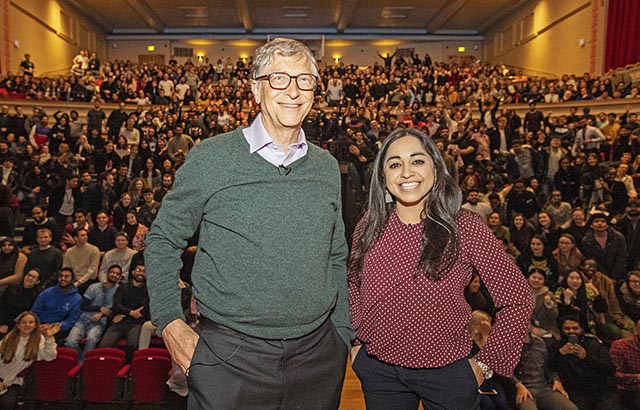Malnutrition is a ‘super underinvested’ global issue according to Bill Gates
Malnutrition and obesity will be the major global public health issues in the next 20 to 30 years, according to Microsoft co-founder Bill Gates who was speaking at an event at Queen Mary University of London.

Bill Gates and Dr Shahidha Bari. Image credit: jonathancolephotography.com
The co-chair of the Bill & Melinda Gates Foundation took questions from students in a wide-ranging Q&A which was moderated by Dr Shahidha Bari, Senior Lecturer in Romanticism at Queen Mary and a regular broadcaster on BBC radio.
When asked by a student medic about the healthcare issues likely to present a challenge in the near future he said they would be malnutrition, but also obesity for the ‘rich world’.
“The one that is super underinvested in is malnutrition. It turns out that kids who have limited diets, their microbiome gets into an inflammatory state and they’re not able to absorb nutrition and that becomes a chronic thing. I still put malnutrition at the top even though the top ten includes HIV vaccine and the TB vaccine,” he said.
The conversation also explored Bill’s interests in education, technology, philanthropy and even why he chose to visit Queen Mary. He said: “Students are the people that are open minded and are going to shape where things go. Queen Mary was appealing because I’ve never been here before and yet the fact that this is a research university doing a lot of great work and it’s very diverse and it’s very engaged in the community I was fascinated by that, I thought it would be a great group of kids to answer questions with.”
Professor Colin Bailey, President and Principal of Queen Mary University of London, added: “We were delighted to welcome Bill Gates to Queen Mary and to provide our students with an opportunity to speak with such an inspiring and influential person. His work has shaped the world we live in and we share his passion in tackling a number of global issues through our own academic research. Hopefully the event will encourage our students to think about what can be achieved throughout their lives.”
Afia Ahmad, a second year student at Queen Mary studying accounting and management, said: “Bill Gates has done phenomenal work for promoting equity in health and opportunity around the world which is one of the core values of Queen Mary and I think having him here with us was an invaluable opportunity for students to learn from his life experiences.”
Worldwide leader
In 1975, Bill Gates founded Microsoft with Paul Allen, and led the company to become the worldwide leader in business and personal software and services.
In 2008, Bill transitioned to focus full-time on his Foundation’s work to expand opportunity to the world’s most disadvantaged people.
In 2010, Bill, Melinda, and Warren Buffett founded the Giving Pledge, an effort to encourage the wealthiest families and individuals to publicly commit more than half of their wealth to philanthropic causes and charitable organisations during their lifetime or in their will.
In 2015, Bill created the Breakthrough Energy Coalition, a group of individuals and entities committed to clean energy innovation, followed by Breakthrough Energy Ventures in 2016, an investor-led fund focused on providing patient capital to support cutting-edge clean energy companies.
To find out more about his work in global health, energy, technology, and Alzheimer’s, among other topics, and to find out what he’s currently reading, visit his blog GatesNotes.
Global health research
Research in global health at Queen Mary has recently attracted £12m funding from the UK government, including projects on latent tuberculosis infection in Ethiopia, and reducing salt intake in China.
Queen Mary’s Global Public Health Unit also carries out research into the impact of armed conflict on efforts to eradicate polio in countries such as Syria, Pakistan, Nigeria and Somalia, and the political determinants of cholera in Yemen, such as the current civil war that has led to the worst cholera outbreak in modern times.
Dr Shahidha Bari is one of the regular presenters of the BBC Radio 3 Arts and Ideas programme Free Thinking. She is the winner of the 2014/15 Observer Anthony Burgess Arts Journalism Prize, for a “powerful and insightful” review of the National Theatre's Medea. Her first book, ‘Keats and Philosophy: The Life of Sensations’ was published in 2012. Her writing also appears in The Financial Times, The Guardian, The Observer and the New Statesman. She is currently writing about the culture of clothes, her book ‘Dressed’ will be published in 2019.
More information:
- Study at Queen Mary
Related items
For media information, contact: